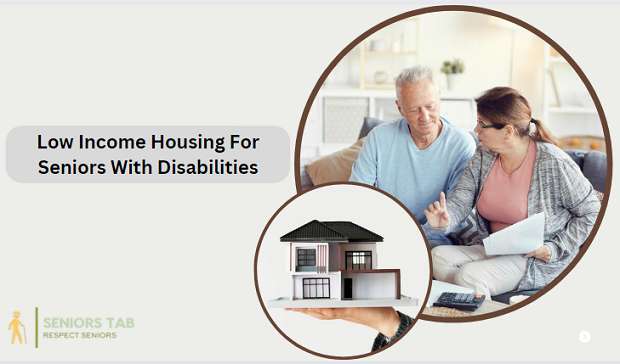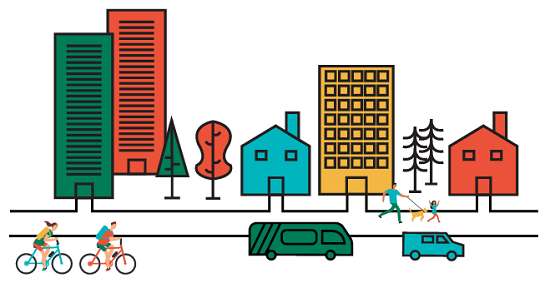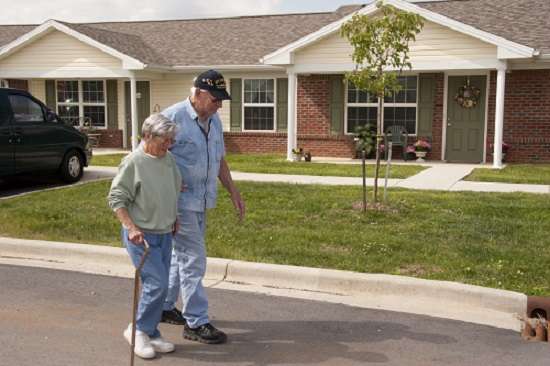Finding affordable homes is never easy, but it can be particularly tough for low-income people with disabilities since it increases their risk of being homeless. According to information from the Annual Homeless Assessment Report, around 500,000 single persons and heads of families who utilized homeless shelters in a year acknowledged having a disability.
However, there are some ways to get low income housing for seniors with disabilities. Residential services for individuals and families in this situation are funded by the U.S. Departments of Housing and Urban Development (HUD) and Health and Human Services (HHS).
There are also municipal, county, and federal programs available. This program can look for several qualifying requirements, including age, criminal history, credit standing, and fixed income. The ability for seniors to spend less for an apartment in which they can remain as long as they like is extremely significant to highlight.
- Key Facts To Know About Low Income Housing For Disabled Seniors
- Section 8 HUD Housing for Disabled Seniors
- Section 202 Housing For Seniors With Disabilities
- Subsidized Rental Housing For Seniors With Disabilities
- USDA Rural Apartment For Seniors
- Application Process for the HUD Voucher Program
- FAQ About Low Income Housing For Seniors With Disabilities
- How to apply for a HUD Housing program?
- How can I locate affordable home options close by?
- Can former service members who need housing assistance?
- Final Verdict
Key Facts To Know About Low Income Housing For Disabled Seniors
- The housing subsidy voucher programs run by state public housing authorities provide low-income housing options for disabled people.
- Depending on specified criteria, many voucher programs target various populations; each program has a distinct qualifying requirement.
- It can be difficult to identify and apply for the appropriate HUD or other federal programs; waiting lists are lengthy and may be closed when demand is too great.
- In addition to the housing help programs provided by federal organizations, several states also offer their own housing assistance programs, so individuals or families should look into their local possibilities.
- The single HUD program, Section 811, is focused on providing community-based, very low-income, people with major impairments with affordable, accessible housing.
How To Get Low Income Housing For Seniors With Disabilities

State, county, and government entities receive funding from HUD and HHS to manage the different programs. To get the advantages, applicants must submit an application to their regional public housing authority (PHA).
Probably the largest significant source of aid for low-income households with a member of the family with an impairment nationwide is the HUD housing voucher program.
The grants are distributed by state and regional PHAs and are subject to the same eligibility requirements concerning income level and scope of financial assistance. The amount of money available cannot keep up with the demand for housing assistance programs like vouchers. Years may pass during the process.
HUD Voucher Initiatives
The HUD voucher programs are exclusively designed to house those with incredibly modest incomes – that is, families earning less than 30% of the local median or poverty level, whichever number is greater.
A household with a voucher typically pays 30% of its income toward rent and utilities; the voucher pays the remaining amount, up to a specified limit, with the percentages and restrictions altering in accordance with the cost of housing in the local market.
To provide suitable housing for people with disabilities, landlords may raise their payment requirements. In fact, this is a reasonable solution that proves to be beneficial in many cases, In actuality, the local PHA may modify the income and eligibility standards to reflect local circumstances.
Households in need such as those who are homeless, housed in subpar conditions, or whose earnings are so low that paying the rent consumes more than 50% of their earnings will receive priority from the PHAs managing the voucher program.
Housing Choice Voucher Program (HCV)
The Housing Choice Voucher (HCV) Program is the primary government-funded housing subsidy initiative. An expansive 2.3 million families and over 5 million individuals across the nation depend on this program for support.
Its mission is to assist vulnerable families, such as the elderly and disabled individuals with limited income, in gaining access to secure and hygienic housing within the private sector.
Although possessing an individual with a disability is taken into account when evaluating an application, having one is not a necessity for receiving an HCV. The Housing Choice Voucher program is an initiative managed by the US Department of Housing and Urban Development to help individuals with housing needs.
HUD manages other rental assistance programs for low-income individuals in addition to this one. The purpose of housing choice voucher schemes is to assist senior citizens in obtaining apartments based on their income. Seniors with impairments and low-income families are also eligible to apply for apartments.
These apartments are offered on a variety of platforms. Seniors who qualify must contribute 30% of their monthly adapted yearly income, with the remaining 70% being handled by the voucher program. Seniors can also purchase apartments under the government’s discounted program.
Mainstream Vouchers
The purpose of mainstream vouchers is to assist families with a handicapped person, aged 18 to 61, living in the home. Mainstream vouchers are handled in accordance with the same guidelines as conventional housing choice vouchers, with the exception of servicing a unique population – applicants under the age of 62.
Non-elderly Disabled (NED) Vouchers
The primary distinction between mainstream and non-elderly disabled (NED) vouchers is the target group, which is households with a disability head, co-head, or spouse. Applications are submitted via the regional PHA, just like with the other vouchers.
Housing Opportunities for Persons With AIDS

The Housing Opportunities for Persons with AIDS (HOPWA) initiative, an effort funded by the federal government, provides assistance to low-income people living with HIV/AIDS and their families. Grantmakers work with charities and housing authorities to give these recipients housing and support.
HUD VA Supportive Housing (VASH)
Veterans of the US military and their households who are facing homelessness or are in danger of losing their homes are eligible for HUD VA Supportive Housing (VASH) vouchers. The Department of Veterans Affairs services are combined with HUD’s HCV housing vouchers for homeless veterans under the VASH program (VA).
With over 100,000 vouchers have been issued under this scheme to qualified veterans as of 2021. Through state PHAs, HUD offers rental assistance vouchers for private equity firm homes. The PHA in your state can provide you with information. Discrimination in housing is prohibited.
There are actions you can take if you believe you have experienced discrimination because of your race, religion, sex, gender, relationship status, use of public aid, national or ethnic origin, impairment, or age. Making a report to HUD or the Consumer Financial Protection Bureau (CFPB) is one of these steps.
Housing Voucher Types
There are two primary types of HUD vouchers:
Tenant-based vouchers: These vouchers “follow the person,” which means that the family that gets the voucher may continue to live in the home that they currently inhabit, provided that the structure satisfies the necessary HUD-established requirements for housing quality.
Following receipt of the voucher, the resident notifies the owner or administrator of the building and requests that a proportion of the rent be paid using the voucher.
The structure will be inspected by a HUD housing inspector if it hasn’t been approved. The resident’s voucher “travels” with them if they want to relocate to another area, even another state.
Project-based vouchers (PBVs): The proprietor of a building or development can join forces with the state or regional PHA in order to rent specific apartments for families and people of limited incomes, as well as those facing disabilities. This agreement will provide them with safe and affordable housing options.
PBVs have the benefit of providing more services close by for elderly or disabled renters since a higher percentage of project inhabitants have comparable requirements, which allows service providers to operate more effectively.
Public Housing Program
State-owned, low-cost rental homes or apartments are known as public housing. This product is intended to assist the elderly, disabled individuals, and households of limited financial means. Public housing can be found all around the country and ranges in size and style from single-family homes to high-rise condominiums.
The Department of Housing and Urban Development (HUD) oversees the program. Lengthy waiting periods are typical because the demand for public housing is frequently greater than the supply of housing that HUD and the local PHA have. When demand for assistance exceeds the capacity of a PHA to provide help in the near term, it may have no choice but to close its lengthy waitlist.
Section 8 HUD Housing for Disabled Seniors

A subset of Section 8, which is low-income housing under government supervision, is HUD senior housing.
This kind of senior living may be found in condominiums, single-family houses, townhomes, or apartments. Seniors must apply to their local housing authorities for the chance to qualify for residence.
While elderly persons who meet specific requirements may be given instant homes, there is usually always a significant waiting list for HUD housing. This includes not having a place to live that is safe and sanitary or being homeless. It also offers Rental Assistance For Disabled On Social Security.
There is an income cap set by the Department of Housing and Urban Development (HUD) that guarantees eligibility for senior programs or government-subsidized assistance programs for seniors.
Section 202 Housing For Seniors With Disabilities
With the help of this program, elderly people who are unable to live independently permanently can obtain an apartment at a reduced rental rate. Seniors with extremely low incomes and advanced age can readily obtain apartments.
You must contact your local HUD office and meet certain requirements if you wish to obtain an apartment. These initiatives include section 202 housing for the elderly and section 8 housing choice vouchers.
However, HUD calculates the senior’s annual income depending just on the average household, which shows how much rent the senior must pay for the apartment. However, the housing benefit from housing for seniors on social security cannot be used to cover the apartment’s cost.
Subsidized Rental Housing For Seniors With Disabilities
Those who are searching for senior living apartments based on income can also get benefited from this government initiative. The government pays condo owners in subsidized housing so they can charge low-income renters a lower rent. Find out where to look for this kind of cheap accommodation.
By using the HUD map, look for a registered housing complex to submit an application for subsidized housing. To search for nearby affordable housing options, click the “find” button and enter your address. If you see the warning “geolocation deactivated,” click “ok.” To search for nearby affordable housing options, click the “find” button and enter your address.
Every property has a unique procedure for receiving rental unit applications. There are waiting lists for some homes. The criteria for becoming eligible for affordable housing vary by city or county. Look up and get in touch with the public housing office that is closest to you to find out if you qualify.
USDA Rural Apartment For Seniors
Another program to assist seniors is offered by the US Department of Agriculture based on income. The section 515 multifamily housing program provides more than 15,000 apartments in rural locations where seniors can live comfortably and meet their housing needs.
These homes can accommodate elderly residents’ demands and are typically found in rural locations. Across all fifty states of the United States, these dwellings are readily accessible. Therefore, the elderly may contact their regional USDA office to confirm if they qualify for this help.
You may like: What Charities That Help With Moving Expenses For Seniors In 2023
Application Process for the HUD Voucher Program
People who need assistance should get in touch with the PHA in their region which manages a voucher system and has an open waitlist for any HUD voucher program. Once the voucher has been authorized, the renter can select from a selection of PHA-approved apartments or apply to stay in their present apartment.
Voucher-related recommendations: Some necessary to take into account applicants being referred by state organizations, specifically the caseworker for the applicant with a disability.
These buildings are privately funded and maintained, and they are typically created to assist the following populations: those who have a persistent mental illness, those who have developmental disabilities, or those who have physical disabilities and could benefit from the amenities.
HUD-approved housing counseling organizations: Finding the right information for your circumstance can take time and be complex if you’re just starting. Housing counseling organizations recognized by HUD provide advice.
The Administration for Community Living (ACL), a department under the HHS, finances numerous housing initiatives designed to support disabled individuals. Moving disabled people from large institutional contexts into smaller group dwellings is one of the key objectives of the ACL.
FAQ About Low Income Housing For Seniors With Disabilities
How to apply for a HUD Housing program?
How can I locate affordable home options close by?
Can former service members who need housing assistance?
Final Verdict
Now you understand how to acquire affordable housing for elderly individuals with disabilities. For those with disabilities living on a lower income, finding cost-effective and accessible lodging can be a daunting task. HUD and HHS, two government departments, have teamed up to develop a more coherent response to services.
According to a press release promoting the alliance, states and municipalities have siloed residential and service systems. Older persons and individuals with disabilities, among many other populations, would be better able to obtain supportive services for home stability if systems worked together more effectively.
